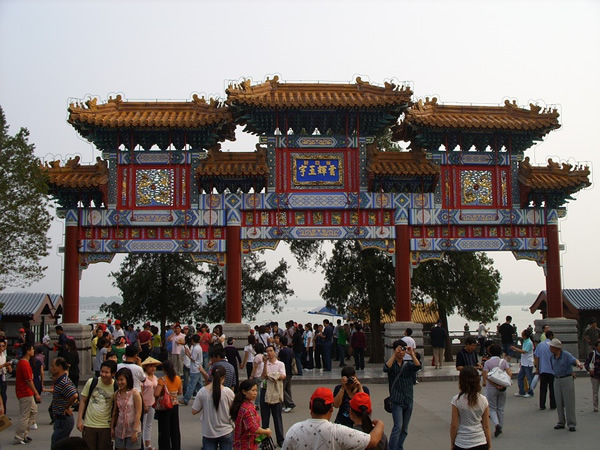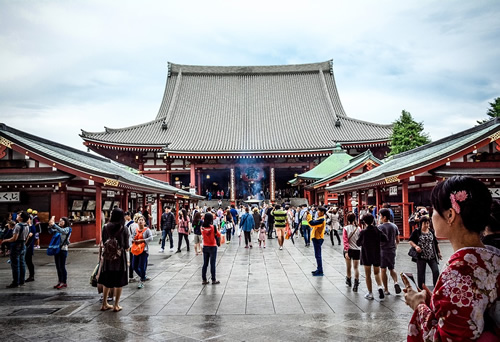Living Abroad in China: The Land of Paradox
Ancient Traditions Coexist with Modern Life
By Robert Vance
 |
| A temple gate in China. |
Sitting in a dark room in front of four men who were dressed in burgundy robes, their hair shaved close to their heads, I nervously held a cup of warm butter tea in my hands. I pretended to like it. But when they refilled the cup, my enthusiasm waned—the tea needed more sugar. But I was not focused on drinking. I was engrossed in a conversation with four Buddhist monks in the upper kitchen of an ancient temple just outside of Lhasa, Tibet.
The youngest of the monks in the darkroom—who also happened to be one the cooks at the monastery—had previously offered me an invitation to join them as I explored the temple. Later, after I had climbed the rickety steps to the kitchen, we were joined by some of the more senior monks who had come to ensure that lunch was being prepared. After a long morning of motionless meditation and praying I was not surprised that these men were hungry.
While the cooks were cutting up vegetables and warming the stoves, I tried out the little Chinese I knew in order to attempt to communicate, while they filled in the gaps with the little English they had learned. We talked about their lives as monks. I introduced myself and told them about my family back in America. They were interested in my life, but they were far more interested in the World Cup, which was nearing its completion during my visit to Tibet; the monks wanted to know the latest scores and my predictions. The monks also were anxious to find out whether I liked to play basketball and what I thought about world politics. The questions asked caught me by surprise, but I attempted to satisfy their thirst for information.
Only after I was on the bus back to Lhasa did I begin to understand what I had just witnessed. These men had committed themselves to a sacred discipline that had existed in China since ancient times. They had spent their days in dark rooms lighting incense and reciting ancient chants. Yet they still yearned for knowledge of the outside world; they still desired to be a part of the great changes that were and still are occurring in their country. I realized that these monks were representative of a culture that is at once desperately fighting to hold on to its traditional roots, yet is eagerly welcoming modern ideas and technology. This paradoxical struggle has created a unique mix of the old and the new. This is China.
 |
| Monks praying in Lhasa, Tibet. |
The Adjustment
Sitting in a dark room again, this time I was alone and feeling very sorry for myself. My first week in China had been a whirlwind of excitement and discovery. From high atop the magnificent Great Wall to the picturesque canals of ancient Zhou Zhuang near Shanghai, the introduction to China had seduced my heart with her culture and people. But now, as I sat in the living room of the apartment that my school had rented for me, reality began to overcome the initial excitement. Over and over I questioned my decision to come to China. I had no friends here. My Chinese vocabulary consisted of no more than ten words. On Monday, I would be teaching five classes and meeting the English staff. I was overwhelmed and tired. Adding to my misery, the school had forgotten to pay the electricity bill, so I sat in the dark for two days wondering why I had ever boarded the plane that had carried me to Beijing.
Yet I did not go home. I recognized that I was experiencing a very common phenomenon called “culture shock”—which can be especially brutal in a country like China. Although Western fashion and ideas have flooded this still-developing country, the culture here can be nonetheless very peculiar for someone who has never traveled to Asia. The crowded and noisy streets, the feeling of being utterly illiterate, eating food that cannot be identified, and being stared at incessantly were experiences that left me feeling alone and out of place. For a few days, the 3,600 miles that separated me from my hometown in the United States was more than just a distance on a map. I could feel the separation pulling at my heartstrings. Almost everyone experiences some degree of culture shock in China and the key to overcoming it is to recognize that it is only a temporary condition. It will pass if you are willing to be patient.
As quickly as the culture shock hit me, it disappeared. I made an introductory speech to my new ESL students and moved into the English office. I was introduced to the English staff who welcomed me with open arms. The lights came on in my apartment. I was now able to test out the washing machine, microwave, and more importantly, the Internet. This new connection with my family as well as the friendships that I was able to make at the school lifted my spirits. Soon I felt ecstatic to be living in China.
 |
| Modern apartment building in Shanghai. |
Working in China
Unless you are working for a company that does business in China, the best job opportunities for foreigners can be found in the thousands of schools, universities, and training centers who employ native speakers of English. While the salaries will not be nearly as high as what you might expect to earn in developed countries, you can usually expect to earn about five times the average local wage. Depending upon your salary, you will also often receive a generous compensation package, which may include free housing and reimbursement of airfare. Unless you are a heavy partier or a compulsive shopper, you should be able to save some money while you are in China.
Where can you start the process of finding a teaching job in China? Many websites offer helpful tips and message boards where you can search through hundreds of jobs. If you wish to communicate with expats who are currently in China, you may want to visit Internations — China. The process of finding a job may seem overwhelming but actually it is not so difficult once you know how and where to look, and there are many sites to help you find English teaching jobs.
What Do I Need to Know About Living in China?
The People
“In Life There is No Rest”
When the ancient Chinese philosopher Confucius uttered these words over 2,000 years ago, he could not have known just how true they would ring in the centuries to come. Or maybe he did know... The Chinese people have traveled a long and tumultuous road to arrive at their present juncture in history. Until recent years, life was centered around one goal in China—survival. There was no time to think about the finer things in life such as enjoying a movie or attending a university. Such notions were reserved exclusively for dreams; reality dictated that putting food on the table was the main focus in life.
Few people in China seem to be bitter about the past. Instead, most seem thankful that they have lived to see the days when China has opened its doors to the world. If anything, the hardships that have been experienced by many generations of Chinese people have only served to strengthen their resolve to survive and push their country forward. Chinese people are extremely loyal to each other and to their government. Their love for their country transcends their national hero Chairman Mao and the Communist Party; their love is for the sacred nature of the land upon which their ancestor’s struggles built a firm foundation for China’s future.
The Chinese people always took care of each other during hard times, and they continue that tradition today. While the common Chinese greeting: "Have you eaten?" is now just a rhetorical question, the Chinese people are and have always been very generous and hospitable. Complete strangers have invited me to share dinner with them in China, while others have welcomed me into their homes during my extensive travels across the country. No matter the misunderstandings I have experienced with the language or culture, I have found that Chinese people are always willing to help me. For this very reason, my years teaching and traveling in China have been relatively smooth.
The Chinese people also have a strong work ethic based upon the survival mentality of the past. Featuring the world's largest population, China is not a land where good jobs are readily available. People work hard because they need the money and also because they are aware of the very competitive world in which they live. Buildings in China sprout up like “magic beanstalks,” and new businesses seem to appear overnight. Working long hours on tedious jobs is a way of life in China. It is the only way people can feel somewhat secure about their future.
While holidays may be few and far between, they know how to enjoy themselves. The happiness that emanates from Chinese people on holidays such as Spring Festival and Mid Autumn's Day is highly contagious. I have been fortunate enough to be invited to some of these holiday events and I have always enjoyed myself immensely.
In short, while most Chinese are still focused on making ends meet, they are by no means working robots. They enjoy sitting down to have a big meal with friends or spending an evening singing karaoke. Most are very curious about the West and are thrilled to have the chance to communicate with foreigners. They hope someday that they will not have to work as hard so that they can spend more time learning English and visiting the many beautiful sights in China.
 |
| Enjoying a festival. |
The Land
Even though I have never considered myself to be much of a nature enthusiast, the natural beauty in China has always enthralled me. From the snowy peaks of the Himalayas to the scorching deserts of Xin Jiang Province, China has something to offer almost everyone who enjoys nature. No matter where you live, the stunning beauty of China's rivers, mountains, and valleys are just a bus ride away. I used to ride my motorcycle for many miles through the rolling farmland of China, where ancient culture still reigns. In the countryside, you can experience what I like to call 'the Real China," where you can observe a way of life that has remained unchanged for hundreds of years. And do not forget about China’s numerous rivers, including the mighty Yangtze River which runs from the Himalayas eastward all the way to Shanghai, as well as the Yellow River which is said to be the mother of Chinese civilization. Traveling in a country so full of natural beauty becomes addictive.
 |
| The Yangtze River. |
The History
The natural beauty of this vast country is enhanced by the rich history which permeates China. Temples built into the faces of cliffs, ancient cemeteries surrounded by towering mountains, and pagodas that overlook sparkling lakes are just a few of the historical artifacts. While I was fortunate enough to have lived just five minutes from an ancient wall during my first year teaching, I have never had any trouble finding some evidence of distant history in cities across China.
The Great Wall of China, along with the Forbidden City and the Summer Palace, are must-sees for any traveler to China. But do not forget to spend a few days in Xi'an visiting with the Terracotta Warriors, or Chengdu exploring the ancient Dujiangyan irrigation structure which was built in 256 B.C. and is still in use today.
The Food
I remember that my mouth was still burning for an hour after my first authentic meal in China. My Chinese colleagues at the school had taken me to a Hot Pot restaurant near the town's square where, as the name suggests, we all shared meat and vegetables in a boiling and spicy pot. It was days before my stomach recovered.
Since that first meal, of course, I have tasted many other types of cuisine in China. I have come to enjoy eating rice noodles, spring rolls, vegetable dumplings, rice balls, banana porridge, and a variety of vegetable soups. Foods that I never particularly cared for in the U.S., such as eggplant and tofu, have been become favorites because of the spices and sauces that the Chinese incorporate into their cooking. Some of the more exotic foods that I have tried include turtle (and turtle eggs), rabbit, donkey, pigs blood, snails, and grubs.
No matter your taste, you should be able to find Chinese foods that you will enjoy. But just in case you get a little homesick for Western fast food, never fear. McDonald's and KFCs have been sprouting up everywhere, and supermarkets in China are often full of Western foods such as bread, cheese, and cereal. Some supermarkets even offer an aisle of imports where you can shop for your favorite Western brands.
Having Fun in China
Chinese people work hard and play hard. Some natives like to sing their hearts out for hours at popular Karaoke Bars (KTV), while others prefer to spend an evening whacking back and forth at a birdie on a badminton court. Friends will take turns inviting each other out to eat, while others will spend hours shooting at each other via a computer game at local Internet cafes. When energy levels are low at the end of a long workday, many Chinese people will relax by watching a movie at home, or chatting with friends on the popular messaging services in China. Should you seek more Western-style entertainment, you should have no problem finding movie theaters or increasingly popular wine bars in major cities.
Challenges
While China's economic and social progress in the last 30 years is nothing short of remarkable, it is important to remember that the country is still in an intense period of development. As such, there are some aspects of the system in China which can drive even the most long-suffering and experienced ex-pats crazy. Here are a few challenges that you are sure to encounter when you live in China:
Population: With a current population of over 1.3 billion people, it is very easy for ex-pats living in China to feel as if they are just a grain of sand on an endless beach. Trying to do anything or go anywhere can be a major hassle in this overcrowded country. Waiting in line for two hours or more at the bank, being packed into public buses like sardines, and fighting to keep your place in line at a supermarket are all common experiences in China. Being patient and giving yourself plenty of time to do things and get places is key to maintaining your sanity in China.
Asking for Help: As a result of the population density in China, you will often discover that employees in banks and government services are indifferent to the problems that are thrown their way throughout the day. Finding the information you need can be a frustrating experience, especially when the person who is supposed to be assisting you does not even bother to look up. Having a Chinese friend who is persistent can greatly improve your chances of receiving the services that you need or the practical problem you need to have resolved.
Theft: Most Chinese people will tell you that they have lost at least two cell phones. What they really mean to say is that they were robbed of their cell phones by one of the numerous thieves operating on the streets and buses throughout China.You usually will not even know what has happened until you reach into your pocket for your phone and find that it is long gone. Thieves in China are very adept at slashing pockets and purses in order to quickly and quietly remove items. Holding valuable possessions in your hands or at least guarding your pockets by keeping your hands inside are always good rules of thumb. Women in China should hold their purses tightly to their bodies when standing on a bus or walking through crowds.
The Language: Many foreigners who come to China have grand aspirations about learning the Chinese language. Unfortunately, Mandarin, or Putonghua (which means the People's language) is one of the hardest languages in the world to learn. Part of the challenge lies in the four tones that exist in Chinese. A given sound in Chinese has at least four different meanings depending on its tone. While many foreigners can pick up decent conversational skills, tackling the written language is even more daunting a task. There are no letters in the Chinese language; there are just hundreds of intricate characters that evolved from pictures that were once drawn to represent objects or actions in ancient times.
Fortunately, with the aid of Chinese Pinyin (a system that allows Chinese characters to be presented by combinations of letters), learning Chinese is feasible for the most foreigners coming to work in China. However, you should not expect to make quick progress learning the language; patience and practice are key. Many foreigners find language partners in China who are willing to trade Chinese lessons for English lessons. If you are very serious about learning the language, it should not be too difficult to find a Mandarin class in your area. No matter how you go about learning the language, do not become too frustrated. Learning Chinese is a process that can take many years, so do the best you can and realize that thousands of other foreigners also find the language extremely challenging.
Conclusion
Once you have spent some time in China, you likely will soon share with me the discovery that I made as I sat in that kitchen in the ancient temple outside of Lhasa, Tibet. While the shadows of their past still loom in the form of ancient walls and dark temples, they have embraced the future with open arms. They desire to be a part of the international community; they are excited about the ever brightening horizons that surround their country. If you travel to China, you can experience the best of both worlds by appreciating the development and progress while at the same time enjoying the vast history and cultural richness of this great country. This is China.
Robert Vance is a China-based freelance writer and teacher who has traveled extensively throughout Asia and Latin America. Robert spent more than a decade as a radio broadcaster in the United States before moving to Asia to focus on writing about Chinese culture. He has also lived and traveled throughout Mexico and Central America. He holds a degree in Spanish and International Studies from the University of Michigan.
|
